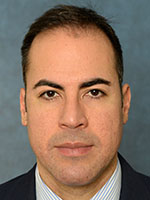Senior Reporter
Proceed With Caution Regarding Transportation Earmarks, Stakeholders Say

[Stay on top of transportation news: Get TTNews in your inbox.]
This year, the chairman of the transportation committee in the U.S. House of Representatives intends to allow members to submit specific requests to designate funding for highway and transit project designations — a long-dormant process known as earmarking.
The transportation panel, led by committee chairman Rep. Peter DeFazio, is planning to resume the practice as part of its consideration of a highway policy bill. DeFazio (D-Ore.) and his Democratic colleagues have pledged that this return to earmarking will be done via a transparent process.
Earmarks have been banned for about a decade, but transportation stakeholders have been expecting the move by Democrats to undo the ban. They note that DeFazio has touted earmarks’ potential benefits over the years.

Mulero
Industry groups are urging lawmakers to ensure transparency guidelines, so that background information about earmarks is made available for public view.
“Congressionally directed projects, or earmarks, can be valuable tools for tackling important government projects,” said Bill Sullivan, executive vice president of advocacy for American Trucking Associations. “If done openly and transparently, earmarked projects give members of Congress more incentive to take a bipartisan and constructive role in shaping an infrastructure bill. In this partisan time, we are encouraged that committee leadership is considering tools to expand bipartisan solutions as they work to address our nation’s crumbling infrastructure.”
Said Susan Howard, program director for transportation finance, American Association of State Highway and Transportation Officials, “I think the big question for us is where remarks will come from. Will they come from states’ federal aid formula dollars — what we call below the line — or will they come from funding above and beyond that, what we call above the line?
“That matters for state [departments of transportation] because we have a program of projects, capital projects, that are planned through our state transportation improvement programs.”
Congressional Pig Book Summary by Transport Topics on Scribd
Longtime critics of earmarks, such as Citizens Against Government Waste, publishers of the Congressional Pig Book (a compilation of projects the group deems wasteful), note that the decadelong earmark ban was established amid concerns that lawmakers sought excessive projects. As an example, they point to the $200 million-plus proposal in Alaska known as the “bridge to nowhere.” Thomas Schatz, the group’s president, suggested that congressional leaders will offer earmarks to members to “make sure they vote for the bill.”
“To say that earmarks are always needed, or have been needed, is just wrong,” he said. “It’s all about the power that it gives to the committees that are allowing earmarks.”
In 2005 … the earmarks severely damaged the public legitimacy of the entire federal-aid program.
Jeff Davis, senior fellow at the Eno Center for Transportation
Jeff Davis, senior fellow at the Eno Center for Transportation, hopes lawmakers will tread cautiously. “I just hope they can restrain themselves,” he said. “The last time [House Transportation and Infrastructure Committee] and [Senate Environment and Public Works Committee] earmarked a highway bill, in 2005, they got carried away and the earmarks severely damaged the public legitimacy of the entire federal-aid program.”
Ed Mortimer, vice president of transportation infrastructure for the U.S. Chamber of Commerce, said, “As long as the process is transparent and supported by state and local chambers and other leaders, it can be a positive tool to gain additional support in enacting an infrastructure modernization bill into law this year.
“Ultimately, this is a decision that is left to Congress, but we do believe members of Congress know their districts and should have an ability to assist the funding of much-needed projects in a transparent way.”
The Week Ahead (All times Eastern)
March 17, 10 a.m.: The Senate Environment and Public Works Committee meets for a hearing on water infrastructure. Watch live here.
March 17, 10 a.m.: The House Transportation and Infrastructure Committee meets for a hearing on climate change. Watch live here.
March 18, 11 a.m.: The House Environment and Climate Change Subcommittee considers “The CLEAN Future Act: Industrial Climate Policies to Create Jobs and Support Working Communities.”
Freight Corridor
A trucking industry snapshot: If you build it, they will come.
Legislative Docket

Rep. Rick Crawford (crawford.house.gov)
U.S. Reps. Rick Crawford (R-Ark.) and Tom Cole (R-Okla.) recently introduced the Reinforcing Utility Restoration After Losses, or RURAL, Act. The measure would pave the way for the U.S. Department of Agriculture to establish a bridge loan program for utility companies hampered by federally declared emergencies.
“With the recent extreme temperatures and increase in power outages due to unprecedented demand, we witnessed the devastation that occurs when communities cannot access critical utility services,” Crawford said. “We must assist utility providers as they work tirelessly to maintain continuity for their customers. The RURAL Act ensures that rural Americans are not without vital resources and rural service providers are bolstered during a federal emergency.”
 Buzz
Buzz

Highway bill markups probably will come in the spring, or summer, per sources.
Favorite Video
The view from the U.S. Chamber of Commerce.
Favorite Tweet
Who wants to be a billionaire?
Elon Musk, Jeff Bezos, Mark Zuckerberg and six other billionaires made more than $360 billion during the pandemic https://t.co/vouJYaEycQ — The Washington Post (@washingtonpost) March 12, 2021
The Last Word
Roy Blunt has been a Missouri institution. A consummate legislator, Roy has worked tirelessly for the state he loves and has served Missourians with distinction.
U.S. Sen. Josh Hawley (R-Mo.) on March 8.
We publish weekly when Congress is in session. E-mail emulero@ttnews.com with tips. Follow us @eugenemulero and @transporttopics.
Want more news? Listen to today's daily briefing below or go here for more info:




